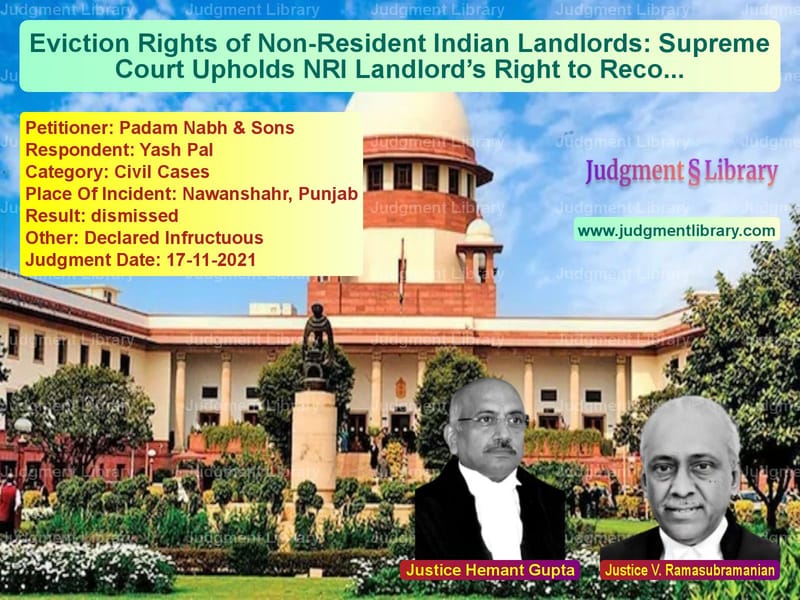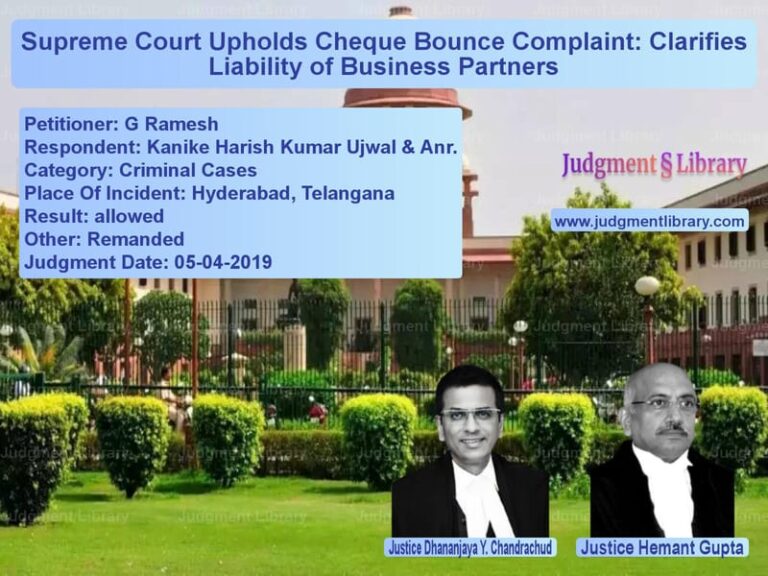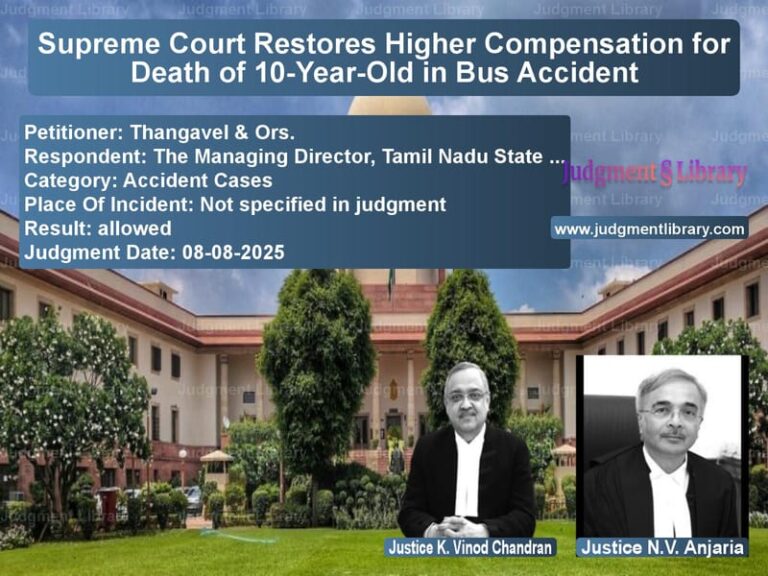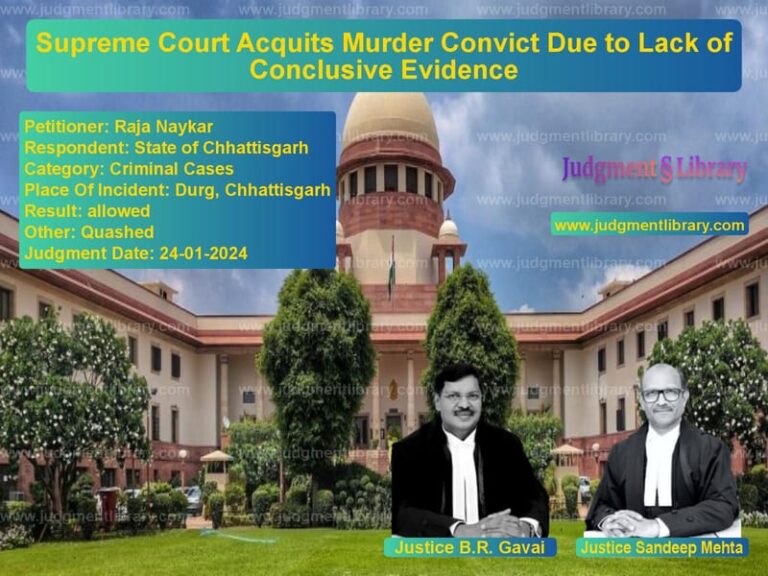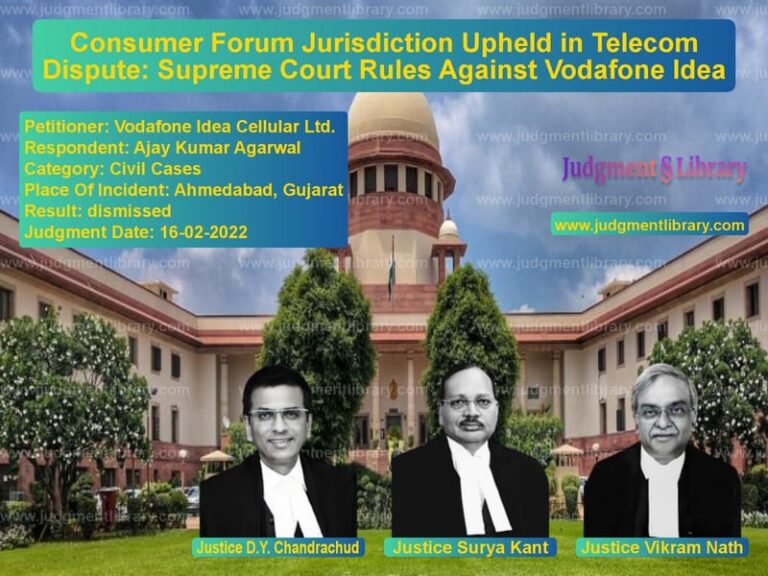Eviction Rights of Non-Resident Indian Landlords: Supreme Court Upholds NRI Landlord’s Right to Recover Possession
The Supreme Court of India recently adjudicated a crucial matter concerning the eviction rights of Non-Resident Indian (NRI) landlords under the East Punjab Urban Rent Restriction Act, 1949. The case, Padam Nabh & Sons vs. Yash Pal, revolved around the interpretation of Section 13-B of the Act, which allows NRIs to reclaim possession of their rented property for personal use.
Background of the Case
The case pertained to a property located in Nawanshahr, Punjab. The original landlord, Sat Prakash, had inducted the appellant’s father, Padam Nabh, as a tenant in a non-residential building. Subsequently, Sat Prakash sold the property to Brij Lal on February 6, 1989. Upon Brij Lal’s demise in 1991, the property was inherited by his sons, one of whom—Yash Pal—migrated to Australia.
After living abroad for several years, Yash Pal returned to India in 2004 and sought possession of the property to establish a departmental store. Invoking Section 13-B of the East Punjab Urban Rent Restriction Act, he filed for eviction of the appellant before the Rent Controller in Shaheed Bhagat Singh Nagar, Nawanshahr.
Read also: https://judgmentlibrary.com/supreme-court-upholds-keralas-forest-land-vesting-popular-estates-case/
Petitioner’s Arguments (Tenant’s Stand)
The tenant, Padam Nabh & Sons, challenged the eviction order on the following grounds:
- Ownership Tenure: The petitioner contended that Section 13-B is only applicable if the landlord had originally let out the premises. Since Yash Pal inherited the property and did not directly lease it out, he should not qualify under the provision.
- Constitution Bench Precedent: The appellant relied on the Supreme Court’s Constitution Bench ruling in Nathi Devi vs. Radha Devi Gupta, which interpreted similar provisions in the Delhi Rent Control Act, 1958, to mean that only landlords who originally let out premises could claim eviction.
- Delay in Filing for Eviction: The appellant argued that the respondent took more than five years after returning from Australia to file the eviction case, which indicated that there was no urgency in reclaiming the property.
Respondent’s Arguments (Landlord’s Stand)
Yash Pal, the NRI landlord, countered the appellant’s claims with the following arguments:
- Legislative Intent: The Punjab Act was amended to specifically grant relief to NRIs, recognizing their difficulties in reclaiming properties that had been rented out decades earlier.
- Five-Year Ownership Condition: Section 13-B requires the landlord to own the property for at least five years before seeking eviction, which the respondent had fulfilled.
- Rental Agreement Continuity: The landlord contended that once tenancy is attorned to a new owner, the new owner also becomes the ‘landlord’ for the purposes of eviction rights.
Supreme Court’s Analysis
The Supreme Court considered several key legal points while adjudicating the case:
Interpretation of ‘Let Out by Him’
The main issue revolved around the phrase ‘let out by him’ in Section 13-B. The appellant argued that this meant only the original lessor could invoke the provision. However, the Court disagreed, stating:
“The moment the tenancy is attorned in favor of the new owner, the property becomes a premises let out by him, creating a valid landlord-tenant relationship.”
Distinguishing Delhi Rent Act from Punjab Rent Act
The Court noted that while the Delhi Rent Control Act, 1958, provided special eviction rights to retired government employees, war widows, and dependents of armed forces personnel, the Punjab Rent Act specifically created special provisions for NRIs.
“The legislative intent behind Section 13-B was to exempt NRIs from the general rigors of rent control laws, given their peculiar challenges in reclaiming their properties.”
Five-Year Ownership Requirement
The Court held that the requirement that an NRI must own the property for at least five years before filing for eviction was a reasonable safeguard to prevent misuse. The respondent had satisfied this condition.
Significance of the Landlord-Tenant Relationship
Even though the respondent inherited the property, the Supreme Court held that once the tenant continued to pay rent after the transfer of ownership, a new landlord-tenant relationship was established:
“When a new owner is attorned as a landlord, he steps into the shoes of the previous landlord for the purpose of tenancy rights, and Section 13-B applies.”
Final Judgment
The Supreme Court dismissed the appeal and upheld the eviction order, granting the NRI landlord the right to reclaim possession of the property. However, the Court provided the tenant six months’ time to vacate the premises, subject to filing an undertaking within two weeks.
Impact of the Judgment
This judgment reinforces the rights of NRIs under the East Punjab Urban Rent Restriction Act, 1949, ensuring that they can reclaim their properties despite prolonged tenancies. The ruling:
- Clarifies that NRIs who inherit properties are eligible to invoke Section 13-B.
- Ensures that the five-year ownership condition acts as a safeguard against arbitrary evictions.
- Distinguishes Punjab’s rent laws from the Delhi Rent Control Act, recognizing Punjab’s unique socio-economic conditions.
Conclusion
The Supreme Court’s ruling in Padam Nabh & Sons vs. Yash Pal is a landmark judgment upholding the rights of NRIs to reclaim possession of their properties. By rejecting a narrow interpretation of the law, the Court has set a precedent that protects NRI property owners while ensuring fair treatment for tenants.
Petitioner Name: Padam Nabh & Sons.Respondent Name: Yash Pal.Judgment By: Justice Hemant Gupta, Justice V. Ramasubramanian.Place Of Incident: Nawanshahr, Punjab.Judgment Date: 17-11-2021.
Don’t miss out on the full details! Download the complete judgment in PDF format below and gain valuable insights instantly!
Download Judgment: padam-nabh-&-sons-vs-yash-pal-supreme-court-of-india-judgment-dated-17-11-2021.pdf
Directly Download Judgment: Directly download this Judgment
See all petitions in Landlord-Tenant Disputes
See all petitions in Property Disputes
See all petitions in Judgment by Hemant Gupta
See all petitions in Judgment by V. Ramasubramanian
See all petitions in dismissed
See all petitions in Declared Infructuous
See all petitions in supreme court of India judgments November 2021
See all petitions in 2021 judgments
See all posts in Civil Cases Category
See all allowed petitions in Civil Cases Category
See all Dismissed petitions in Civil Cases Category
See all partially allowed petitions in Civil Cases Category

